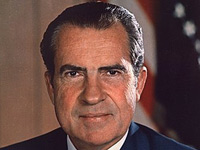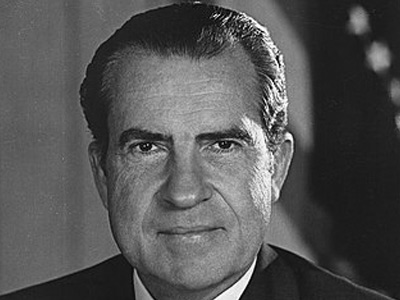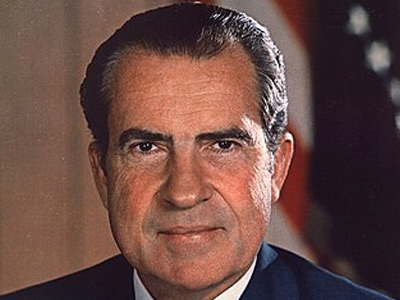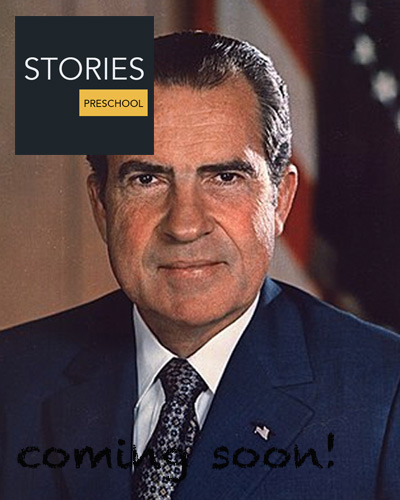Early Life
Richard Milhous Nixon was born on January 9, 1913, in Yorba Linda, California, in a house that was built by his father. His parents were Hannah (Milhous) Nixon and Francis A. Nixon. His mother was a Quaker, and his father converted from Methodism to the Quaker faith. Through his mother, Nixon was a descendant of the early American settler Thomas Cornell, who was also an ancestor of Ezra Cornell, the founder of Cornell University, as well as of Jimmy Carter and Bill Gates.
Nixon's upbringing was marked by evangelical Quaker observances of the time such as refraining from alcohol, dancing, and swearing. Nixon had four brothers: Harold (1909–33), Donald (1914–87), Arthur (1918–25), and Edward (1930–2019). Four of the five Nixon boys were named after kings who had ruled in medieval or legendary Britain; Richard, for example, was named after Richard the Lionheart.
Nixon's early life was marked by hardship, and he later quoted a saying of Eisenhower to describe his boyhood: "We were poor, but the glory of it was we didn't know it". The Nixon family ranch failed in 1922, and the family moved to Whittier, California. In an area with many Quakers, Frank Nixon opened a grocery store and gas station. Richard's younger brother Arthur died in 1925 at the age of seven after a short illness. Richard was twelve years old when a spot was found on his lung. With a family history of tuberculosis, he was forbidden to play sports. Eventually, the spot was found to be scar tissue from an early bout of pneumonia.
Primary and secondary education
Young Richard attended East Whittier Elementary School, where he was president of his eighth-grade class. His parents believed that attending Whittier High School had caused Richard's older brother Harold to live a dissolute lifestyle before he fell ill of tuberculosis (he died of the disease in 1933), so they sent Richard to the larger Fullerton Union High School. He had to ride a school bus for an hour each way during his freshman year, and he received excellent grades. Later, he lived with an aunt in Fullerton during the week. He played junior varsity football, and seldom missed a practice, even though he was rarely used in games. He had greater success as a debater, winning a number of championships and taking his only formal tutelage in public speaking from Fullerton's Head of English, H. Lynn Sheller. Nixon later remembered Sheller's words, "Remember, speaking is conversation ... don't shout at people. Talk to them. Converse with them." Nixon said he tried to use the conversational tone as much as possible.
At the start of his junior year in September 1928, Richard's parents permitted him to transfer to Whittier High School. At Whittier, Nixon suffered his first election defeat when he lost his bid for student body president. He often rose at 4 a.m., to drive the family truck into Los Angeles and purchase vegetables at the market. He then drove to the store to wash and display them before going to school. Harold had been diagnosed with tuberculosis the previous year; when their mother took him to Arizona in the hopes of improving his health, the demands on Richard increased, causing him to give up football. Nevertheless, Richard graduated from Whittier High third in his class of 207 students.
College and law school education
Nixon was offered a tuition grant to attend Harvard University but Harold's continued illness and the need for their mother to care for him meant Richard was needed at the store. He remained in his hometown and attended Whittier College with his expenses covered by a bequest from his maternal grandfather. Nixon played for the basketball team; he also tried out for football but lacked the size to play. He remained on the team as a substitute and was noted for his enthusiasm. Instead of fraternities and sororities, Whittier had literary societies. Nixon was snubbed by the only one for men, the Franklins; many members of the Franklins were from prominent families, but Nixon was not. He responded by helping to found a new society, the Orthogonian Society. In addition to the society, schoolwork, and work at the store, Nixon found time for a large number of extracurricular activities, becoming a champion debater and gaining a reputation as a hard worker. In 1933, he became engaged to Ola Florence Welch, daughter of the Whittier police chief. The two broke up in 1935.
After graduating summa cum laude with a Bachelor of Arts in history from Whittier in 1934, Nixon received a full scholarship to attend Duke University School of Law. The school was new and sought to attract top students by offering scholarships. It paid high salaries to its professors, many of whom had national or international reputations. The number of scholarships was greatly reduced for second- and third-year students, forcing recipients into intense competition. Nixon not only kept his scholarship but was elected president of the Duke Bar Association, inducted into the Order of the Coif, and graduated third in his class in June 1937.
HISTORY

RESOURCES
This article uses material from the Wikipedia article "Richard Nixon (1913-1994)", which is released under the Creative Commons Attribution-Share-Alike License 3.0.
© Stories Preschool. All Rights Reserved.










